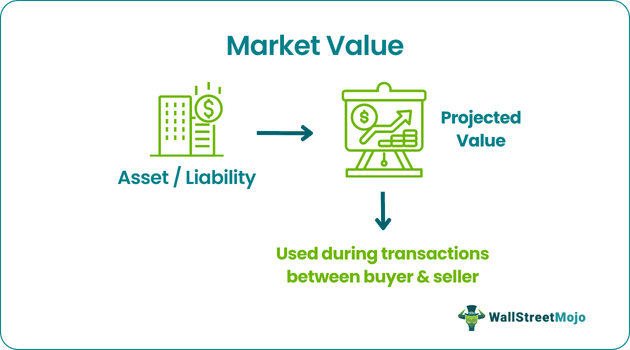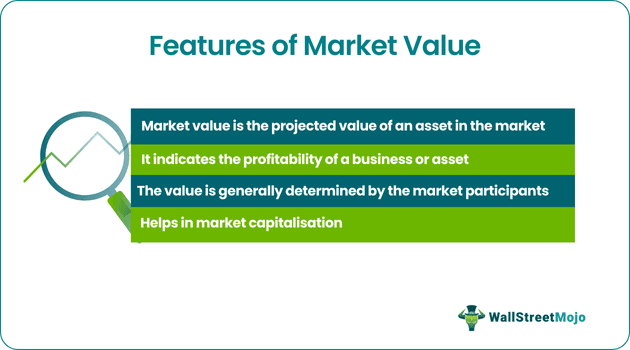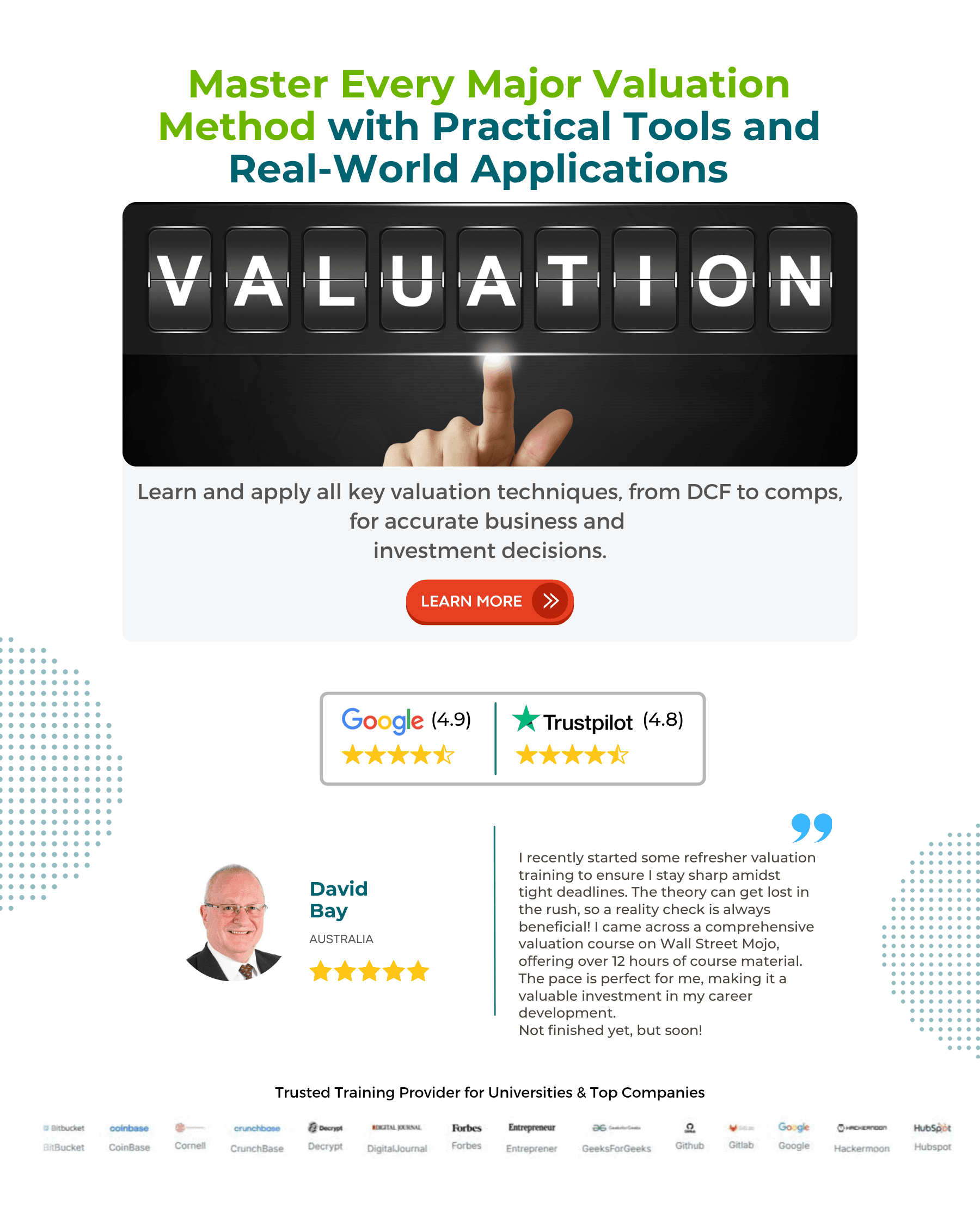Table Of Contents
What Is Market Value?
Market Value (MV) is the projected value for which an asset, or liability, would exchange between a willing buyer and seller in an independent transaction, following proper marketing, and where both parties acted with knowledge, caution, and without compulsion. It also represents the value a person is willing to invest in an asset or business.

The market value represents the company's worth in a financial market. The market participants (buyers and sellers) determine the value when they agree with each other. They often utilize it for market capitalization in the case of a publicly traded company. A shareholder's wealth is considered maximized if the share's value is maximized.
Key Takeaways
- The market value of a property or an asset is its current value in the market. The parties engaged in the transaction (sellers and buyers) usually determine this value.
- Market capitalization is one of the most important criteria for estimating a stock's returns and risk. It also helps investors choose equities that fulfill their risk appetite and objectives.
- Many factors influence a company's market valuation, including growth potential, stock performance, and valuation measures such as earnings per share, book value per share, price to earnings ratio, etc.
Market Value Explained

The current market value of a property or an asset is its value in the marketplace. The involved parties usually determine this value. This value is crucial, especially to determine the reserve price for the strategic sale. The companies should value land and other physical assets at current market price and relevant factors for the same. For example, in the case of a real estate property, the insurable interest will most likely be the property's market value. However, the property's ground does not get included in the insurable value and therefore should be calculated accordingly.
In the case of the market value of equity, the organization's primary purpose is to increase the value of the company's equity shares. The wealth of equity shareholders are present in the market value of a company's equity shares, which they frequently trade on stock markets. Only when this value of the shares is maximum is the shareholders' wealth reaches higher value.
Estimated market value is especially useful in determining the market capitalization of an asset. One can find a business’s market capitalization by considering its present share price and the total outstanding shares. It also assists investors in selecting stocks that fulfill their risk and diversification requirements. In addition, the value of shares during the previous six months will become an indicator of worthiness in the case of publicly traded corporations.
Video Explanation Of Market Value
Formula
Arriving at the value is easy; anyone can compute it by multiplying the current market price of the company's stock by the total number of outstanding shares. One of the essential variables that help an investor estimate the share's returns and risk is market capitalization. The formula is given below:
Market Value = Market capitalization
Market capitalization = Number of outstanding shares x Current Market Price.
There is no single method for calculating current market value because many metrics play a part in determining it. Market capitalization can be as simple as an approach to figuring out the worth of an asset in the market. It is a similar but distinct indicator for determining its financial health.
The price a business sells for in an actual sale reveals the rate it fetches in the market. The next best approach after market price is to compare sales of similar firms; to price the business accurately, one needs the acquisition of necessary statistical evidence to price. In addition, it helps investors determine where a business stands about its competitors in that particular industry.
How To Calculate?
Finding the fair value of private companies that do not publicly publish their financials can be difficult. One can do it by comparing a private company's worth to publicly traded companies in the same industry with similar sizes. They should also consider factors such as growth rates and computing relevant ratios to put its performance into context.
The present capital worth of all future gains and liabilities is the market value of an investment. Investors then look at it and decide whether a stock is worth the investment. Market value, therefore, reveals the company's actual overall value and the profitability, debt, and financial health it possesses. It also eliminates uncertainty regarding the fair estimation of the asset's worth.
For equities, no readily available Market value of equity formula exists. One can arrive at the value by considering various factors such as earnings per share, value per share, price to earnings ratio, etc. Similar is the case of the market value of a property. The supply and demand factors play a major role in determining the same, apart from considering elements such as location, available amenities, etc.
Examples
Let us look at some suitable examples to understand the concept.
Example #1
Dan wants to sell his property of 1000 square meters. He wants to sell it for $100,000. Unfortunately, he could not find a buyer willing to pay more than $50000, given the location's lack of nearby amenities. Though the property might have a good standard and can be sold at better rates in the future, the current market value (considering all factors) is $50000 only.
Example #2
Twitter had faced a drop of about 13% since its peak point in April 2022. Market close on at one point showed that the stock is at $45.08 traded well below the $54.20 that Elon Musk agreed on in April 27. This is a huge difference, accounting to almost $9 billion in marketplace value. Due to regulatory challenges, the market was slightly less confident on whether should finalize the merger. Twitter's stock price went down because of unfavorable market sentiments. There was no requirement of using any market value of equity formula, even if it existed as outside factors such as these can affect those values.
Market Value vs Book Value
Both the concepts or terms given above are very frequently used in the financial market. Let us try to point out some differences between them, as follows:
The former represents the current price at which the assets of the business can be bought or sold whereas the latter shows the net woth of the business based on the financial statements.
Market value vs. book value is a common case of debate and people sometimes misunderstand it as the same concept. Both concepts are often compared when determining whether an asset is adequately valued.
True market value is commonly refer to market capitalization. According to its books, financial statements, or balance sheet, the net value of a corporation is its book value. The difference between a company's total assets and total liabilities is used to calculate its book value. Therefore, calculating book value takes a little longer than calculating market value.
A stock is deemed undervalued if its market cap is significantly lower than its book value, indicating that it is being traded at a discount. However, the contrary is not always true. For example, the estimated market value for profitable enterprises are frequently higher than book values. This is due to investors' optimism about their development and expansion potential. It may be because certain organizations have greater earning capacity or the ability to make a profit than their current assets. However, a higher true market value than book value may suggest that the item is overvalued in certain circumstances.

